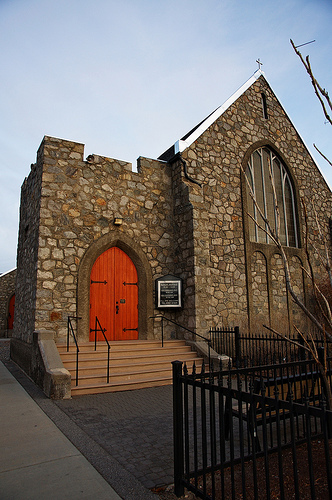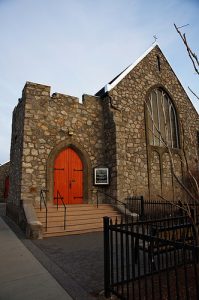Print Edition: July 8, 2011
By Paul Esau (The Cascade) – Email
Q: What’s more controversial than religion, same-sex marriage, or a vicious legal dispute?
A: A vicious legal dispute involving the religious implications of same-sex marriage.
This is an appropriately bad joke for an equally ugly trial. A couple weeks ago on June 16 the Supreme Court of Canada refused to hear the appeal of four dissenting Anglican churches to an earlier decision, putting an end to one of the more interesting court cases of the last decade. The defendant, the Diocese of New Westminster under Bishop Michael Ingham, was awarded the physical buildings of each of the four churches, along with court costs. The plaintiffs, including Abbotsford’s own St. Matthew’s Anglican Church, were left (supposedly) with the theological high ground… and no roof over their heads. After nearly a decade of conflict the legal battle may be over, but the war is going strong, and one has to wonder how it got so ugly. The question of homosexuality within Anglicanism is a convoluted one and will not be argued out here, but what of the church politics around it? What Christian principle exactly is invoked when four parishes launch a lawsuit against the greater church?
In a Protestant-minded community like Abbotsford, such action seems like overkill, yet that reflects an ignorance of the structure of authority within the Anglican Church. Within this structure, the Diocese of New Westminster administers and oversees the surrounding parishes, holding title to all major assets and negotiating theological issues. The Diocese itself technically answers to the greater Anglican Communion, but since the Anglican Church lacks the central authority of an infallible Pope figure, the decision-making process is more democratic than the Roman Catholic hierarchal structure. This system gives the Diocese a fair amount of theological and political freedom, while the individual parishes are more rigidly controlled. Breaking this control, as St. Matthews attempted to do, requires drastic action (such as a lawsuit).
Ironically enough, it seems that the Diocese itself faced little trouble breaking radical new ground for the greater Anglican Church. When the decisiona was made in 2003 to condone blessings for long-term, covenanted relationships of same-sex couples, it was apparently done with little official approval outside the immediate diocese. As The Winsor Report of 2004 states (requested by the Archbishop of Canterbury to study the issue of homosexuality within the context of Anglicanism), “neither […], nor the Diocese of New Westminster, in deciding and acting as they did in 2003, went through the procedures which might have made it possible for the church to hold together across differences of belief and practice.”
There are several terms used within Anglicanism to define the power of the individual Diocese. The first is the policy of “Subsidiary,” which encourages that local Church issues be solved as close to the local level as possible. The second is that of “Adiaphora,” or “things that do not make a difference,” allowing a certain level of cultural and theological diversity between Dioceses as long as those differences don’t threaten core beliefs. Yet a Diocese is never fully independent, it practices “autonomy-in-relation” to the greater Anglican Church, and is still subject to outside authority. It appears (as suggested in The Windsor Report) that the Diocese of New Westminster considered the same-sex blessing decision to be Adiaphora and therefore made the decision to allow it at the Subsidiary level, while much of the rest of the Anglican Church disagreed.
So we have a situation where an individual parish has been punished strictly for a theological disagreement with a single Diocese, while the Diocese itself has in the past made a major theological deviation from accepted doctrine with nary a consequence (save deepening the schism between those already divided by the issue of homosexuality). It is hardly surprising that the Diocese won the court case considering the Canadian Court System does not accept theological arguments and the Diocese holds all the correct documents, but one has to wonder if four specialized buildings, empty of congregants and dripping with bad blood, are worth the potential cost.



